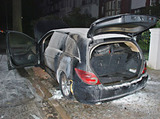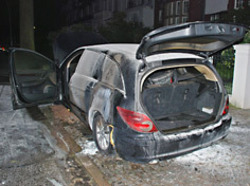
2007-05-22
The car was set on fire outside the family apartment block in Hamburg early this morning
The car was set on fire outside the family apartment block in Hamburg early this morning
Roger Boyes, Berlin
The private Mercedes limousine of the editor of the mass circulation Bild newspaper was set on fire early this morning, apparently by militants gearing up for violent clashes at next month’s G8 summit.
The arson attack on Kai Diekmann’s car sent a ripple of panic through the political class as Germany seems to be hurtling towards a showdown between the anti-globalisation movement and police trying to shield the world’s leaders who will be gathering at a Baltic spa in the first week of June.
Mr Diekmann is one of Germany’s most influential media personalities and Bild, with a readership of about 12 million, is viewed as a conservative arch-enemy by the radical Left. Other personal attacks in the past few months have included the burning of the cars of Thomas Mirow, a junior economics minister, and of a top economic researcher. The house of a senior Lufthansa executive was pelted with paint and bricks, and in Berlin alone there have been 51 politically motivated cases of arson since the beginning of the year.

So far there have been no casualties but the point of the protesters is to demonstrate that they know where the rich and powerful live — and to show that they cannot sleep safely in their beds.
Mr Diekmann’s car was destroyed in the early hours outside his family apartment block in Hamburg.
Ole von Beust, the Mayor of Hamburg said: “There is no such thing as harmless violence against property. We are taking this very seriously indeed.”
Intelligence reports suggest that the radical Left could shift the battleground to Hamburg next month if security measures around the summit prove too restrictive. A 12km (7½ mile) steel and barbed wire fence has been built around the venue, a hotel complex in the resort of Heiligendamm. Police are preparing for their biggest postwar deployment.
The protest movement is beginning to snowball. On May 28 there will be a demonstration in Hamburg against a meeting of European and Asian ministers. On June 2, in nearby Rostock, there will be an anti-G8 rock concert and, over the following days, about 100,000 protestors will converge on a narrow strip of northern Germany — in specially commissioned trains from southern Europe, by ship from Scandinavia but mainly by bus. Tent cities will surround the stockaded compound of the leaders.
In Goerlitzer Park in Berlin veteran anarchists are running masterclasses in how to blockade streets and resist arrest. One aim is to clog access roads from Rostock airport and thus stop interpreters getting to the summit.
The anti-G8 tribes include Catholic groups, trades unionists and even neo-Nazis. But the radical vanguard is made up of three leftist groupings: the Interventionist Left, the Revolutionary G-8 Alliance and Dissent. Police have also mounted raids on an organisation calling itself the Militant Groups.
The aim of the police raids so far has been to detain the gurus of the anti-globalisation movement and discover more about their plans. Over the past month it has become clear that the new generation is making common cause with former terrorists from the 1970s and 1980s. At a Berlin rally this month the veteran terrorist Ralf Reinders — jailed for his part in the 1975 kidnapping of a Christian Democrat politician — defended some of the crimes committed by the Baader-Meinhof gang. The young anti-globalisation protesters applauded and held up placards calling for the release of another former terrorist, Christian Klar.
At least one of the people targeted in this month’s police raids was actively involved in organising a wave of arson attacks to coincide with a 1988 Berlin session of the International Monetary Fund.
“We are worried that the Heiligendamm summit on June 6 will become a crystallisation point for left-wing militancy in Germany,” a security expert said. There was, he said, a parallel to be drawn between the student protest movement of the 1960s during Germany’s first Grand Coalition government and the current protesters, who also see themselves as the only true voice of opposition.
“Student anger fed terrorism in those days,” he said, “we don’t want something similar happening again.”
[http://www.timesonline.co.uk/tol/news/world/europe/article1825572.ece]

